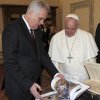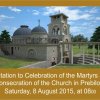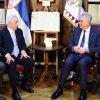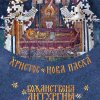Sidebar
Site Map
A great man is one who collects knowledge the way a bee collects honey and uses it to help people overcome the difficulties they endure - hunger, ignorance and disease!
- Nikola Tesla
Remember, remember always, that all of us, and you and I especially, are descended from immigrants and revolutionists.
- Franklin Roosevelt
While their territory has been devastated and their homes despoiled, the spirit of the Serbian people has not been broken.
- Woodrow Wilson
ФБИ је чувао Пупина
„Ако пропадне Србија, нек пропаднем и ја” речи су које је изговорио Михајло Пупин дајући своју комплетну тадашњу имовину као залог савезницима за зајам Србији у Првом светском рату, због чега је на себе привукао толику пажњу аустроугарске и немачке тајне службе да је амерички Федерални истражни биро почео да га надгледа. Не да би га контролисали, већ да би га чували од оних који би му због споја његовог патриотизма и ванредног утицаја можда наудили у то ратно време. Делови досијеа, са којег је недавно скинута ознака тајности, ексклузивно ће се од 24. септембра наћи у Београду. Биће то само један од сегмената изложбе о Пупину, која се тог дана званично отвара у Историјском музеју Србије, да би за посетиоце била доступна од 25. септембра па све до 20. фебруара 2016.
Сусрет председника Николића и папе Фрање у Ватикану
Николић и папа су разговарали и о формирању мешовите комисије Српске православе цркве и Римокатоличке цркве која би разматрала историјске чињенице из периода Другог светског рата и улогу Алојзија Степинца у Независној држави Хрватској.
Током посете Ватикану Николић је уручио Орден Републике Србије на ленти кардиналу Пјетру Паролину, државном секретару Свете Столице, за истакнуте заслуге у развијању и учвршћивању пријатељских односа и сарадње између Републике Србије и Свете Столице.
Holy New Martyrs of Prebilovci – Herzegovina
Over there, in the south, in the vicinity of Hutovo, the Neretva, and the Bregava, on a hill in Prebilovci a miracle is happening. An event is happening, the most important event for man, the world and its existence. Resurrection is happening. God is frequenting his people; God is resurrecting human bones; Lord’s Wisdom is building a home for Himself and them, the martyrs’ bones.
Seventy-five years ago the martyrs of Prebilovci lived the same lives as we do today: they worried, they worked, they feared, they hoped, they had things and were deficient in them, they rejoiced and mourned, they sang at times and at times they cried; they fantasized, loved and dreamed.
However, some other people, having let evil and the evil one into their hearts, set their minds on murdering them. Not merely to deprive them of their property, their joy and sorrow, but of much more – they set their minds on depriving them of the life itself. And they committed the misdeed. They murdered the women, the children, the adults, the elderly men and women. They threw them into pits, bottomless pits, into the deepest darkness, into the depths of soil. Then, among themselves they divided the plunder – their property, their husbandry, their sheep and horses, their oxen, their fruits and vegetables, their corn and vineyards. But soon, as soon as the war was over, it was not to be for them to enjoy the plunder. The evil people roamed about the world; the murderers and slayers; drunkards, liars; their tracks were covered and they would vanish without leaving a trace. Finally, fifty years after the Golgotha, martyrs’ bones saw the light and the sun; they shone in the midst of the darkness of human evil as peace and a reminder, and the sons of the martyrs, at last, buried their ancestors’ bones worthily.
.Србољуб Динић на Мокрој Гори
Када уђете у Антрополошки музеј у Сијудад Мексику, у првој сали стоји слика Лепенског вира као представника европске цивилизације, каже Србољуб Динић, шеф-диригент опере у Сијудад Мексику, који ће од данас бити гост фестивала „Бољшој” на Мокрој Гори, и са младим талентима и виолинистом Немањом Радуловићем дириговати Четврти концерт Чајковског.
Динић је 12 година био шеф-диригент опере у Берну. Гостовао је у Кини, Кореји, Италији, Немачкој. Већ две године је у Мексику за који каже да је мешавина супротности. Људи тамо воле оперу. Постоји удружење „Про опера” где имућни дају новац да најбољи млади певачи студирају у Европи.
.A Nobelist Received "The Christian Heritage of Kosovo and Metohija"
Председник Србије је нобеловцу поклонио књигу „Хришћанско наслеђе на Косову и Метохији - историјско и духовно средиште српског народа”.
Николић и Љоса разговарали су и о борби која је после тог распада настала за доказивање идентитета у неким новонасталим Републикама.
„Србија није пролазила кроз ту фазу, ми имамо вишевековну традицију и јасан национални идентитет, посвећени смо помирењу, али је још увек много бола у сећању народа”, рекао је председник Републике.
Љоса је говорио о Југославији и њеном угледу и значају у Латинској Америци.
„Југославија је била веома присутна и позната у Перуу и на неки начин била узор”, рекао је Љоса.
.Лекарски сан остварује на Менхетну
Срећна је ових дана млада лекарка из Ужица Марија Каљевић, јер је, каже, почела да остварује свој сан. Чврсто решена да се што боље у струци усавршава, добила је специјализацију из интерне медицине у Њујорку и радиће је по програму престижне болнице „Маунт Синај” с Менхетна.
Успела је то Марија у конкуренцији неколико хиљада лекара из целог света, сврставши се међу 28 одабраних којима је пружена шанса да се специјализују за жељену област медицине. Но тај изазов неће бити лак за Ужичанку: већ после прве године ове специјализације од почетних 28 њих 18 добија пролаз у другу годину и могућност да заврше целокупан трогодишњи посао, док ће осталих десеторо морати да тражи другу шансу.
Mogli su da rade bilo gde na svetu, ali oni su se vratili u Srbiju
Dok se sve više priča o odlasku mladih i obrazovanih iz Srbije u svet (700 diplomaca godišnje), o tome da “neće imati ko da ugasi svetlo” jer je Srbija druga u svetu po odlivu mozgova, ipak nije sve tako crno.
Najmanje hiljadu fakultetski obrazovanih ljudi vratilo se u Srbiju iz svih krajeva sveta (od SAD preko Evrope do Australije).
Svako od njih vredno radi, pokreće projekte, primenjuje znanje stečeno napolju, ne kuka i ne čeka da dobije posao.Okupljeni su u neformalno udurženje “Repats” (povratnici), koje je osnovala Jovana Ružičić (34). Ona se 2010. godine vratila iz SAD.
Announcement and call for financial support to the Youth Philharmonic Naissus
After winning two Gold medals in Prague and Bratislava and IV places in Vienna, Youth Philharmonic Naissus, for the first time in the history of Serbia, invited to participate at the world competition of Youth Orchestras in Los Angeles, from 14th, to 18th, June 2015.
During this period, it will have a competitive performance in the most prestigious concert hall in the world WALT DISNEY Hall, as well as evening concert in the Disney park in LA. Also, members of the orchestra attendees one-day Masterclass with obtaining a certificate, which will lead to superior Conductor, educator Lawrence Sutherland.
More: The Naissus Youth Philharmonic Orchestra Nis - Serbia
.








